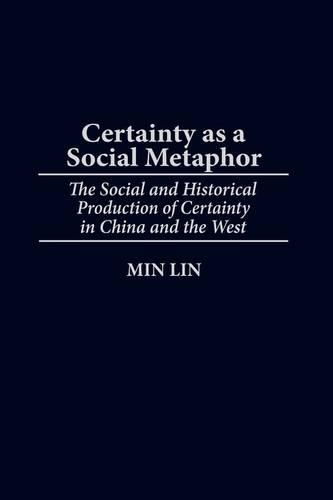
Certainty as a Social Metaphor: The Social and Historical Production of Certainty in China and the West
(Hardback)
Publishing Details
Certainty as a Social Metaphor: The Social and Historical Production of Certainty in China and the West
By (Author) Min Lin
Bloomsbury Publishing PLC
Praeger Publishers Inc
30th November 2000
United States
Classifications
Tertiary Education
Non Fiction
Philosophy: epistemology and theory of knowledge
East Asian and Indian philosophy
Social theory
121.63
Physical Properties
Hardback
304
Description
This volume combines philosophy, the social theory of knowledge, and historical analysis to present a comprehensive study of the idea of certainty as defined in the Western and Chinese intellectual traditions. Philosophical ideas such as certainty are the products of deeply layered socio-historical constructions. The author shows how the highly abstract idea of certainty in philosophical discourse is connected to the concrete social process from which the meaning of certainty is derived. Three different versions of certaintyin modern Western thought, in German Idealism, and in traditional Chinese philosophyare examined in the context of a historical-comparative study of Western and Chinese social processes. Three versions of the idea of certainty are represented by the three distinct philosophical discourse and societies explored in this book. However, the pursuit of certainty transcends culture as a fundamental aspect of philosophical thought. This in-depth study shows how the social genesis and function in philosophy of the specific meaning of certainty has been delineated through a process of complex idealogical negotiation by dominant social groupsthe bourgeoisie in modern Western Europe, the nobility and state bureaucrats in 18th- and 19th-century Germany, and the landed gentry in traditional China. The author concludes by suggesting new avenues for study inspired by his research.
Reviews
[T]his book is a powerful one and deserves consideration as we seek for new ways of understanding the world, particularly the future.-Futures
[T]his is a valuable text for philosophers and anyone working in the human sciences, not excluding those other scientists, such as physicists, biologists and mathmaticians, who might have much to say about its contents. It is densely written and an asset to epistemological literature.-Philosophy in Review
This book is a first-rate contribution to philosophic scholarship, with special reference to comparative epistemology. Copious notes, excellent bibliography, and useful index. Highly recommended to graduate students and research faculty.-Choice
"This book is a powerful one and deserves consideration as we seek for new ways of understanding the world, particularly the future."-Futures
"This is a valuable text for philosophers and anyone working in the human sciences, not excluding those other scientists, such as physicists, biologists and mathmaticians, who might have much to say about its contents. It is densely written and an asset to epistemological literature."-Philosophy in Review
"[T]his book is a powerful one and deserves consideration as we seek for new ways of understanding the world, particularly the future."-Futures
"This book is a first-rate contribution to philosophic scholarship, with special reference to comparative epistemology. Copious notes, excellent bibliography, and useful index. Highly recommended to graduate students and research faculty."-Choice
"[T]his is a valuable text for philosophers and anyone working in the human sciences, not excluding those other scientists, such as physicists, biologists and mathmaticians, who might have much to say about its contents. It is densely written and an asset to epistemological literature."-Philosophy in Review
Author Bio
MIN LIN is Senior Lecturer and Chair of East Asian Studies at the University of Waikato, New Zealand. He is Associate Editor of the New Zealand Journal of East Asian Studies and author of The Search for Modernity: Chinese Intellectuals and Cultural Discourse in the Post-Mao Era (1999).
